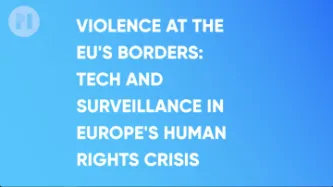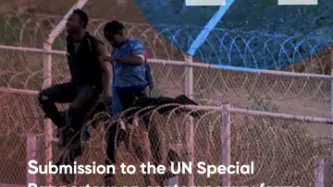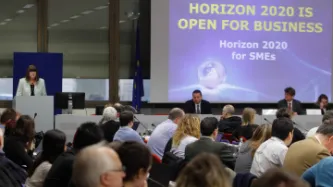Search
Content type: Press release
The decision by the EU’s oversight body follows a year-long inquiry prompted by complaints outlining how EU bodies and agencies are cooperating with governments around the world to increase their surveillance powers filed by Privacy International, Access Now, the Border Violence Monitoring Network, Homo Digitalis, International Federation for Human Rights (FIDH), and Sea-Watch.The complainants welcome the decision by the European Ombudsman and call on the Commission to urgently review its…
Content type: Long Read
Since early 2021, PI have been investigating and challenging the latest stride in the UK’s cruel migration policies: the roll-out of GPS ankle tags to monitor migrants released on immigration bail, a dehumanising, invasive method of control that monitors and records people’s precise location 24/7.
More recently, we found out through Freedom of Information Requests that the Home Office is working to roll out "smartwatches" - devices that also record 24/7 location data, but instead of being…
Content type: News & Analysis
Privacy International (PI) has today filed complaints with the Information Commissioner (ICO) and Forensic Science Regulator (FSR) against the UK Home Office's use of GPS ankle tags to monitor migrants released on immigration bail. This policy and practice represents a seismic change in the surveillance of migrants in the UK. PI was first alerted to this scheme by organisations such as Bail for Immigration Detainees, an independent charity that exists to challenge immigration detention in the…
Content type: Advocacy
Today, PI filed a complaint with the Forensic Science Regulator (FSR) in relation to quality and accuracy issues in satellite-enabled Global Positioning System (GPS) tags used for Electronic Monitoring of subjects released from immigration detention (GPS tags). We are concerned there may be systemic failures in relation to the quality of data extracted from tags, processed and interpreted for use in investigations and criminal prosecutions.
The GPS tags are used by the Home Office to…
Content type: Advocacy
Privacy International (PI) welcomes the call of the Special Rapporteur on the human rights of migrants to assess the human rights impact of current and newly established border management measures with the aim of identifying effective ways to prevent human rights violations at international borders, both on land and at sea.
The issues highlighted in the call for submissions are ones that PI has been investigating, reporting and monitoring as part of our campaigns demanding a human rights…
Content type: Video
Links
Josoor International Solidarity’s website is at https://www.josoor.net
No Name Kitchen’s website https://www.nonamekitchen.org
Border Violence Monitoring Network’s Website is at https://www.borderviolence.eu
Their reports documenting violence and trends in Greece and the Balkans route are at https://www.borderviolence.eu/category/monthly-report/
Lighthouse Report’s investigations on pushbacks in the Aegean are available at https://www.lighthousereports.nl/investigation/…
Content type: Advocacy
We wrote to the Home Office as part of our campaign ‘STOP SPYING ON ASYLUM SEEKERS’, opposing the draconian surveillance of asylum seekers taking place through the Aspen Card.
We asked detailed questions about how data collected from Aspen Card usage is used to monitor asylum seekers, and how the Home Office are alerted to any ‘breach of conditions’ of the card.
In their reply, the Home Office told us that:
“The Home Office can be alerted to a breach of conditions by several internal and…
Content type: News & Analysis
2022 will see a raft of high tech surveillance tools emerging in the UK government’s arsenal, which will further entrench a ‘hostile environment’ for migrants. Compounding this further, immigration officers will increasingly be using digital forensic tools such as 'mobile phone extraction' under a veil of secrecy. This raises serious concerns about overreach, misuse and abuse of power, the actual quality and integrity of the data they gather, and independent oversight of these powers. But it…
Content type: Examples
Human rights experts have accused the home secretary, Priti Patel, of ignoring legal guidance in an attempt to target child asylum seekers who cannot prove they are under 18.
A letter from the Home Office, seen by the Observer, reveals that the government is putting pressure on social workers to speed up the age assessment of unaccompanied minors, and offering to bankroll councils that face legal challenges as a result. The move comes as new evidence shows that hundreds of people were deported…
Content type: News & Analysis
A new report by the UN Working Group on mercenaries analyses the impact of the use of private military and security services in immigration and border management on the rights of migrants, and highlights the responsibilities of private actors in human rights abuses as well as lack of oversight and, ultimately, of accountability of the system.
Governments worldwide have prioritised an approach to immigration that criminalises the act of migration and focuses on security.
Today, borders are not…
Content type: News & Analysis
In the last few weeks, the UK government has announced various new measures to ensure that crossings across the Channel were “inviable” including by appointing a new role of “clandestine Channel threat commander" and further plans to deploy the navy to stop migrants from crossing to the UK from France across the Channel. Premature plans it seems, as not only would such measures be contrary to the UK’s international obligations to allow individuals to seek asylum in the UK, but also since such…
Content type: Explainer
In the name of reinforcing migration control and increasing security, the EU is introducing a host of new surveillance measures aimed at short-term visitors to the Schengen area. New tools and technologies being introduced as part of the visa application process and the incoming “travel authorisation” requirement include automated profiling systems, a ‘pre-crime’ watchlist, and the automated cross-checking of numerous national, European and international databases. There are significant risks…
Content type: Examples
The US Immigration and Customs Enforcement service announced in July that the State Department will not issue visas to students whose universities shift to online-only learning and they must leave the country or face deportation. More than 1 million higher education students in the US come from overseas, though enrollment has been declining since 2016, and the move is a blow to university budgets. Eight percent are planning to operate online-only, 60% are planning for in-person instruction, and…
Content type: Long Read
Over the last two decades we have seen an array of digital technologies being deployed in the context of border controls and immigration enforcement, with surveillance practices and data-driven immigration policies routinely leading to discriminatory treatment of people and undermining peoples’ dignity.And yet this is happening with little public scrutiny, often in a regulatory or legal void and without understanding and consideration to the impact on migrant communities at the border and…
Content type: Case Study
The EU have been using foreign aid budgets, not to lift people out of poverty, but to export surveillance technologies used to repress people’s human rights all over the world.
A wave of anti-immigration fervour has swept across Europe in recent years. As leaders have come to power across Europe either on anti-immigration platforms or having to respond to an anti-immigration sentiment, the EU’s recent policies have been shaped by the drive to stop migration to Europe.
Surveillance…
Content type: Advocacy
Privacy International (PI), Fundaciòn Datos Protegidos, Red en Defensa de los Derechos Digitales (R3D) and Statewatch responded to the call for submission of the UN Special Rapporteur on contemporary forms of racism, xenophobia and related intolerance on how digital technologies deployed in the context of border enforcement and administration reproduce, reinforce, and compound racial discrimination.
This submission provides information on specific digital technologies in service of border…
Content type: Long Read
There are few places in the world where an individual is as vulnerable as at the border of a foreign country.As migration continues to be high on the social and political agenda, Western countries are increasingly adopting an approach that criminalises people at the border. Asylum seekers are often targeted with intrusive surveillance technologies and afforded only limited rights (including in relation to data protection), often having the effect of being treated as “guilty until proven…
Content type: Examples
Taking advantage of the pandemic to close US borders, the Trump administration is also spreading coronavirus infection by deporting detainees to receiving countries such as Guatemala, where 20% of infections are deportees. Guatemala has only two hospitals and a scattering of smaller regional medical facilities to serve its population of 18 million people. As of April 2020, 5,000 Guatemalans were being held in detention in the US, and every week the Department of Homeland Security was sending…
Content type: Explainer
Social media platforms are a vast trove of information about individuals, including their personal preferences, political and religious views, physical and mental health and the identity of their friends and families.
Social media monitoring, or social media intelligence (also defined as SOCMINT), refers to the techniques and technologies that allow the monitoring and gathering of information on social media platforms such as Facebook and Twitter which provides valuable intelligence to others…
Content type: Advocacy
Privacy International responded to the call for submissions of the Working Group on the use of mercenaries as a means of violating human rights and impeding the exercise of the rights of peoples to self-determination on role of private military and security companies in immigration and border management and the impact on the protection of the rights of all migrants.
This submission builds on PI’s research and reporting highlighting examples of the involvement of private companies in…
Content type: Advocacy
To the Members of the European Parliament and to the Committee on Budgets of the European Parliament
The EU urgently needs to step up and provide assistance to protect the health and safety of people trapped in camps on the Greek islands - not just to protect their welfare, but to contain the virus itself as a matter of global public health.
However, as we detail in the briefing below, the current European Commission proposal for funds allocation is insufficient to ensure the safety of…
Content type: News & Analysis
Amid calls from international organisations and civil society urging for measures to protect the migrant populations in Greece and elsewhere, last week, the European Commission submitted a draft proposal to amend the general budget 2020 in order to, among other measures, provide assistance to Greece in the context of the COVID-19 outbreak.
Both at the Turkish-Greek border and in the camps on the Greek islands, there are severe concerns not only about the dire situation in which these people…
Content type: Advocacy
The letter has been signed by more than 40 organisations and it is open for individuals to sign.
At the moment, the Department of Health and Social Care has given no assurance that NHS data will not be shared with the Home Office and used for immigration enforcement, including for those people with a confirmed coronavirus diagnosis.
Assurances which were confirmed by the Irish government as part of their response to COVID-19: last week, during a Parliamentary debate, Irish Minister of Health…
Content type: Case Study
There are 29.4 million refugees and asylum seekers across the globe today. These are people who have fled their countries due to conflict, violence or persecution seeking protection in safer environments.
People have protected those in need fleeing from dire situations since antiquity. However, over recent years, European countries have become increasingly hostile towards refugees - treating them as criminals instead of people in need.
In 2017, German authorities passed a…
Content type: Long Read
It was a quiet evening in Agadez, a bustling Saharan city in the centre of Niger. Thirty-five year old Agali Ahmed was sipping tea at a friend’s place, as he often did, when he received a message: police were at his uncle’s house. When he got there, Ahmed saw men in plainclothes, standing around the building’s gate. Inside, more men were searching the apartment. Three white men, who Ahmed guessed were Spanish, asked for his phone and started taking pictures of him. They told him to follow them…
Content type: Long Read
The European Union (EU) spends billions on research and development aimed at driving economic growth and jobs, as well as furthering the bloc’s broader agenda. Within the current budget, known as Horizon 2020 and covering the years 2014-2020, some €80 billion has been made available for research in a huge number of areas, ranging from finding cures for diseases to helping keep the earth viable for life.
From the same budget, it also funds a lot of projects aimed at developing surveillance…





















